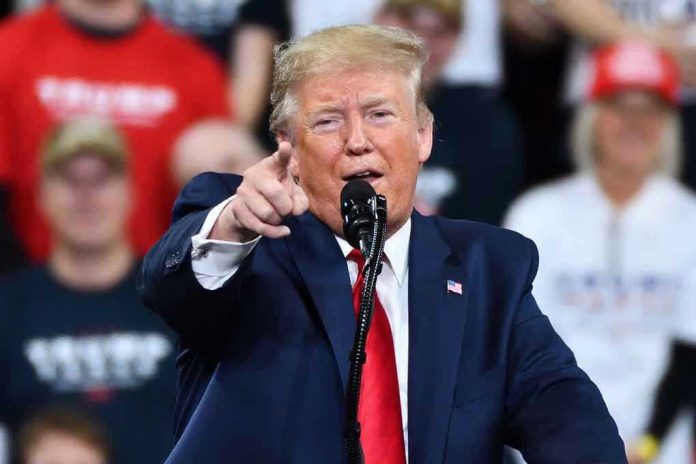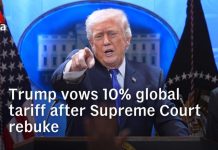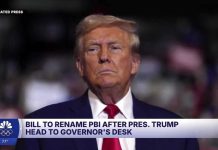
America’s financial offensive against a sprawling migrant smuggling and drug trafficking network from Cancún sends a powerful message: under President Trump, criminal syndicates exploiting our borders and financial systems will pay a steep price.
Story Snapshot
- The U.S. Treasury sanctioned the Bhardwaj Human Smuggling Organization, crippling a global network tied to drug cartels and illegal migration.
- Sanctions freeze U.S.-linked assets and block American businesses from aiding the network’s operations.
- The crackdown exposes how criminal enterprises use legitimate businesses in tourist hotspots like Cancún for illicit activity.
- Mexico’s government is pushing back, demanding more evidence and sparking diplomatic tension over American enforcement actions.
U.S. Treasury Strikes Back at Global Smuggling Network
In late October 2025, the U.S. Treasury Department—through its Office of Foreign Assets Control—delivered a decisive blow to the Bhardwaj Human Smuggling Organization. This notorious criminal syndicate, operating out of Cancún, Mexico, had become a hub for smuggling thousands of illegal migrants, trafficking drugs, and laundering dirty money through front companies in Mexico, India, and the UAE.
The new sanctions freeze any assets tied to the group in U.S. jurisdictions and ban American citizens or businesses from facilitating their operations. By weaponizing financial sanctions, the Trump administration is striking at the heart of the global criminal economy, targeting not just people but the money that fuels their enterprises.
While Cancún is known worldwide as a resort destination, its status as a transportation and banking hub also made it a magnet for organized crime. The Bhardwaj HSO leveraged this infrastructure, using marinas, construction firms, and trading companies as camouflage for human smuggling and drug running.
Cartel partners like the Sinaloa Cartel provided muscle and protection, while corrupt officials ensured safe passage for both people and illicit profits. This sophisticated network exploited weaknesses in border security and financial oversight, moving migrants from Africa, the Middle East, and Asia right into the U.S.—a pattern all too familiar to those frustrated by years of unchecked illegal immigration and lax enforcement.
Sanctions Undercut Criminal Enterprise and Spark Diplomatic Friction
With the new sanctions, U.S. authorities are not only freezing assets but also choking off the network’s ability to move money and people across borders.
Sixteen companies linked to the organization, spanning multiple continents, now face exclusion from the U.S. financial system. Homeland Security and the DEA are actively collaborating with Mexican and international partners to trace assets and identify collaborators.
However, efforts to secure cooperation have hit diplomatic roadblocks. Mexico’s President Claudia Sheinbaum has publicly demanded additional proof from the U.S. before her administration will fully support the crackdown. This standoff highlights the persistent challenge of fighting transnational crime in a world where sovereignty and security interests often collide.
The Bhardwaj HSO’s model—combining human smuggling, narcotics, and money laundering—reflects the evolution of modern criminal enterprises. By embedding themselves in legitimate economic sectors, these groups make detection and disruption far more difficult.
U.S. officials argue that only aggressive financial action, backed by intelligence sharing and law enforcement cooperation, can break this cycle. Meanwhile, Mexican authorities are under renewed pressure to bolster anti-money laundering oversight, especially in the casino and tourism sectors that have long been targets for illicit finance.
Impact on Border Security, Rule of Law, and Conservative Values
For many Americans, this crackdown is long overdue. The network’s activities have undermined border security, facilitated the influx of drugs, and exploited loopholes in the financial system—issues that hit at the core of conservative concerns about sovereignty, law and order, and the rule of law.
By targeting both the criminal ringleaders and the businesses that enable them, the Trump administration is sending a strong signal: America will not tolerate foreign networks eroding its borders or its financial integrity. At the same time, the operation exposes the ongoing threat posed by criminal organizations that thrive on weak enforcement and globalist indifference.
While the sanctions are a significant step, experts caution that such networks are highly adaptive. As authorities close off one corridor, criminal groups often shift tactics, routes, or laundering methods.
Still, this operation stands as a warning to those who would exploit America’s openness for criminal gain—and as a reassurance to those who value strong borders and the preservation of American sovereignty. The ultimate test will be whether ongoing pressure, both financial and diplomatic, can keep these networks from simply reemerging elsewhere.
Sources:
Treasury Department Sanctions International Human Smuggling Network – Presidential Prayer Team
Treasury sanctions alleged human smuggling network operating from Mexico, India, UAE – CBS News
US sanctions human smuggling network operating from Mexico – UNN/AP
Cartel casino cash probably moved through US bank accounts, FinCEN warns – Money Laundering.com







